iPhone 16 Pro Max review: bigger screen, bigger opportunities
We may earn a commission if you make a purchase from the links on this page.

iPhone 16 Pro Max Intro
Now that the iPhone 17 Pro Max is out, the iPhone 16 Pro Max is kind of yesterday's news. Or is it?
It's the first Pro Max that extended the 6.7-inch screen to 6.9 inches. It also has the Camera Control button and the Action Button. And it's the last iPhone, at least for now, with the titanium body. If you don't care about gaming performance but love the feel and endurance of titanium — that's a big one.
And now that it's been dethroned — you can find it cheaper. Be it clearance prices or refurbished, you are probably looking for a deal if you are looking at this review.
Good news — I am currently still using the iPhone 16 Pro Max and mostly like it! No, it didn't get the super AI features that Apple was promising, but let's not beat on that meme. Let's break down what the iPhone 16 Pro Max has to offer — what's great about it and what's not amazing about it...
Also read:
Table of Contents:
iPhone 16 Pro Max Specs
First, let's take a look at the iPhone 16 Pro specs and what has changed from before:
| iPhone 16 Pro Max | iPhone 15 Pro Max | iPhone 14 Pro Max |
|---|---|---|
| Size and Weight 163.0 x 77.6 x 8.25 mm 225 g | Size and Weight 159.9 x 76.7 x 8.25 mm 221 g | Size and Weight 160.7 x 77.6 x 7.85 mm 240 g |
| Screen 6.9-inch OLED 120Hz | Screen 6.7-inch OLED 120Hz | Screen 6.7-inch OLED 120Hz |
| Processor Apple A18 Pro 3nm | Processor Apple A17 Pro 3nm | Processor Apple A16 Bionic 4nm |
| Configurations 8/256GB for $1,199 8/512GB for $1,399 8/1TB for $1,599 | Configurations 8/256GB for $1,199 8/512GB for $1,399 8/1TB for $1,599 | Configurations 6/128GB 6/256GB 6/512GB 6/1TB |
| Cameras 48MP main 48MP ultra-wide 12MP 5X zoom 12MP front | Cameras 48MP main 12MP ultra-wide 12MP 5X zoom 12MP front | Cameras 48MP main 12MP ultra-wide 12MP 3X zoom 12MP front |
| Battery 4,685 mAh | Battery 4,422 mAh | Battery 4,323 mAh |
| Charging 20W wired 25W MagSafe | Charging 20W wired 15W MagSafe | Charging 20W wired 15W MagSafe |
iPhone 16 Pro Max Design and Display
A new button? Not very Apple-like
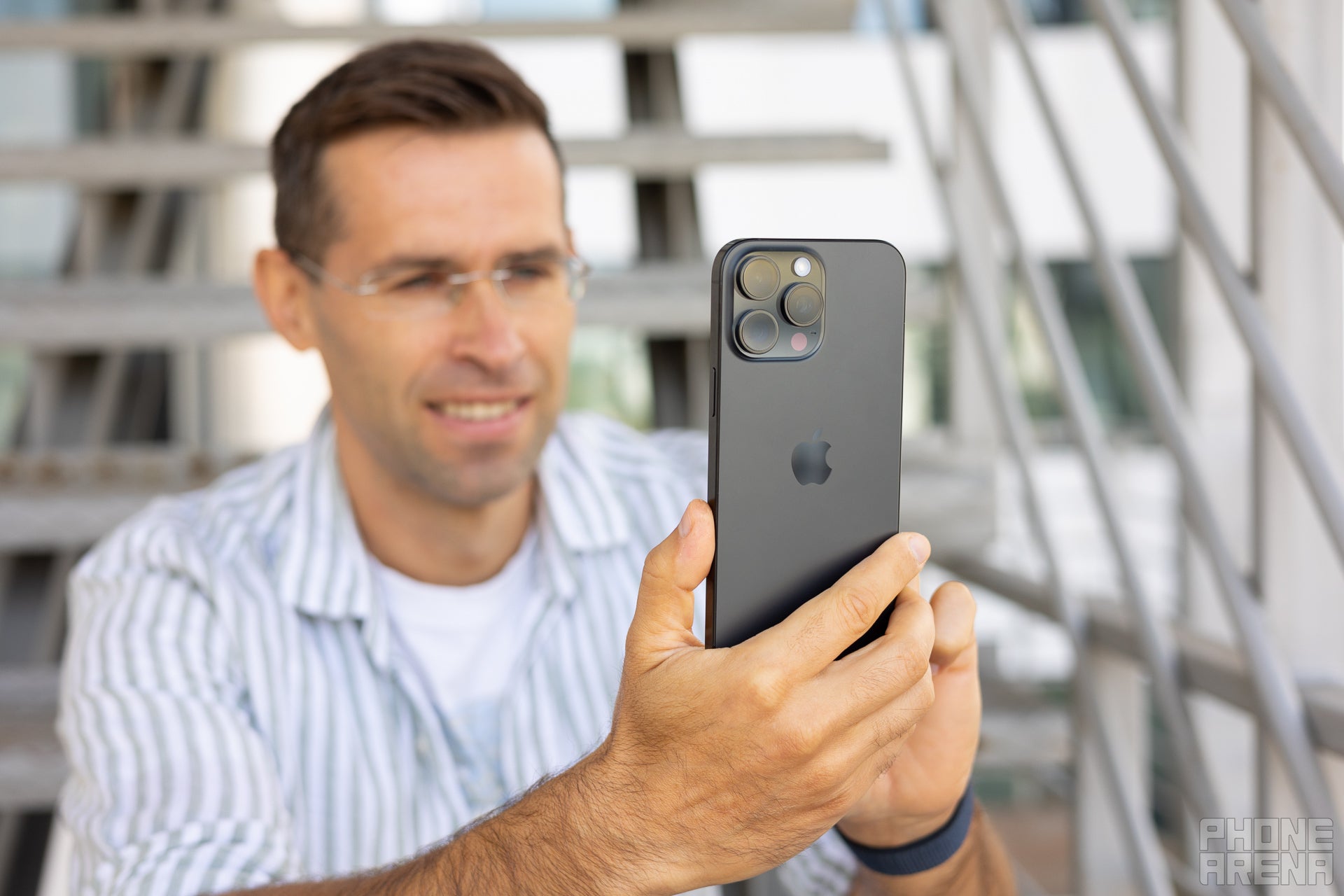
A familiar experience (Image credit - PhoneArena)
The iPhone 16 Pro Max sticks to the design we've known since the iPhone 12 series. Yes, it's all covered in titanium, and there have been some facelifts, but the general guidelines are there.
For example, we have some more screen now, grown to 6.9 inches. But the iPhone 16 Pro Max itself is barely bigger, it just has a razor-thin bezel around the display. Cool.
As usual, the screen is protected by the Ceramic Shield on the front — a new generation of the shatter-resistant glass, Apple says —, and it's rated IP68 for water and dust protection. Some months of use will show if it gets the magical random micro-scratches, which tend to appear on our beloved smartphones. USB C makes its second appearance on an iPhone ever — and with the Pro models, it's a USB 3 port for much faster data transfer speeds. But you will need a cable that supports at least 10 Gb/s to make use of it, as that's not what the iPhone ships with.
We have a new hardware button on all iPhone 16 models! A Camera Control Button, which operates as both a shutter and slider. It's a capacitive area that's also clickable, a light press allows you to shuffle through different settings for the slider, a hard press takes a snap. Or hold it in to record video. Swiping across will modify the currently-selected setting, like exposure, zoom, or bokeh intensity. Also, it's a camera shortcut button — press it and the app opens up instantly.
It's positioned on the right frame — or the top, if the phone is held in landscape. Kind of like Sony Xperia's shutter buttons. But the iPhone's Camera Control button is slightly more awkward, placed a bit far into the frame, so it feels a bit unnatural to use, especially on the Pro Max. You will need to adjust your grip, we'll definitely be following if it's something we can get used to.
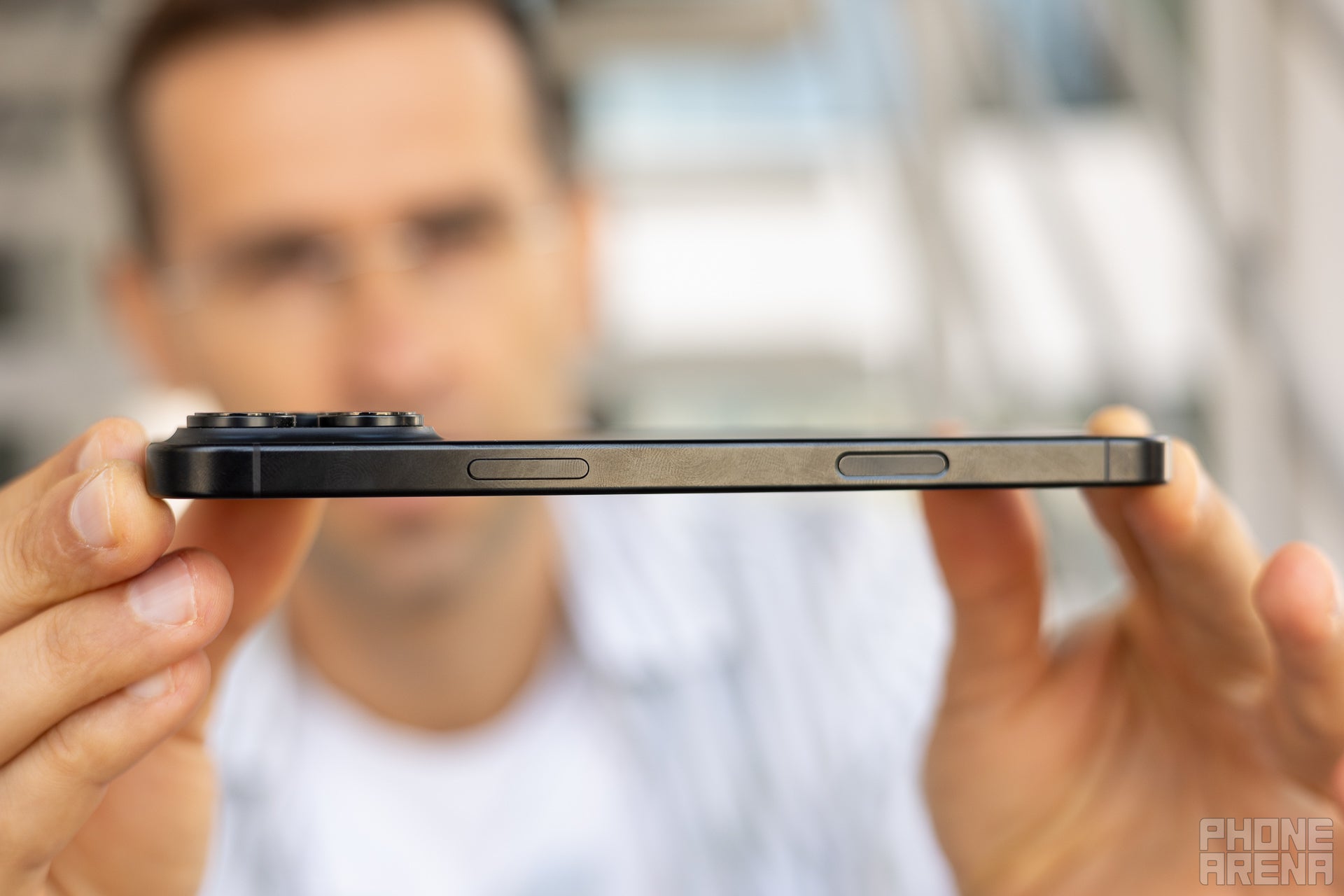
Of course, the good old Action Button makes a return. Some people liked to make the Action Button their camera shortcut — now that this function is free, you can set it to open another app, put the phone in a special DND mode, light the flashlight, or something else.
In terms of colors, we the iPhone 16 Pro Max comes in:
- Black Titanium
- White Titanium
- Natural Titanium
- Desert Titanium
Learn more about all the iPhone 16 colors here.
In the box, we have the phone, USB C cable, and nothing much more.
The phone still has a Face ID system for secure unlocks, hence why the Dynamic Island cutout at the top of the screen is still there, which is an acquired taste by now.
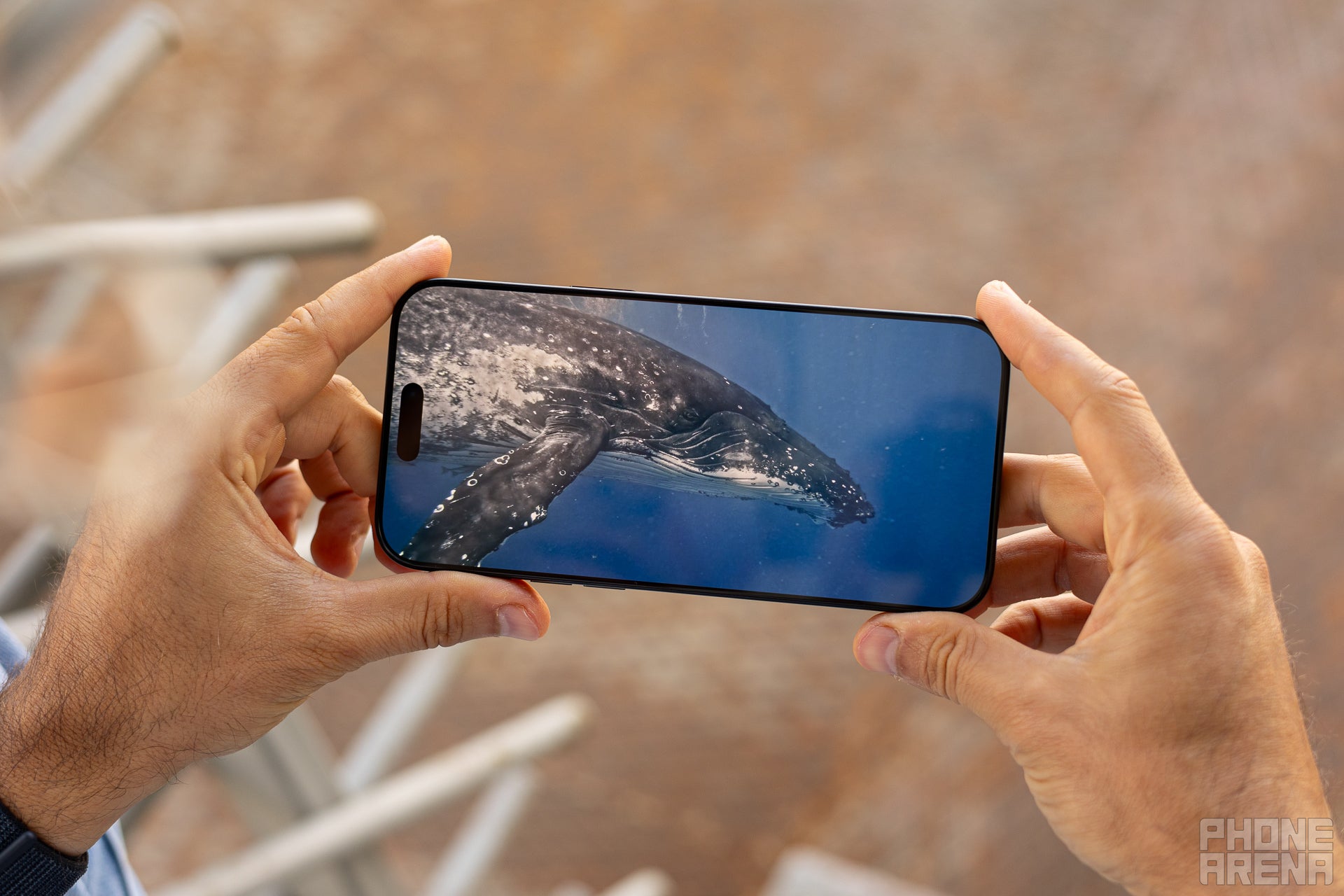
Pretty as ever (Image credit - PhoneArena)
The 6.9" display panel is as pretty to look at as it has been for the past few years. Still OLED with deep blacks and pretty well-tuned colors.
As is common with pentile OLED matrix screens, holding it under precise measuring tools reveals that we do get a bit of drift towards the blues or greens, but the good news is that Apple's True Tone mode works great to adjust the display's cast and warmth depending on your ambient lighting.
It's an HDR-capable screen with 2,000 peak brightness. We do measure fullscreen brightness, which shows that the iPhone 16 Pro Max is capable of sustaining a bit above 1,000 nits. Not bad for outside viewing, but we'd be remiss not to mention that Android flagships are usually topping that easily nowadays.
The big upgrade here is minimum brightness, which was not excellent on iPhones thus far. Now, it drops below 1 nit, which will make it quite comfortable for bedside viewing.
It has a 2868 x 1320 pixel resolution, which means sharpness is about 460 pixels per inch. The aspect ratio is 19.5:9, like before.
iPhone 16 Pro Max Camera
Upgrading the ultra-wide
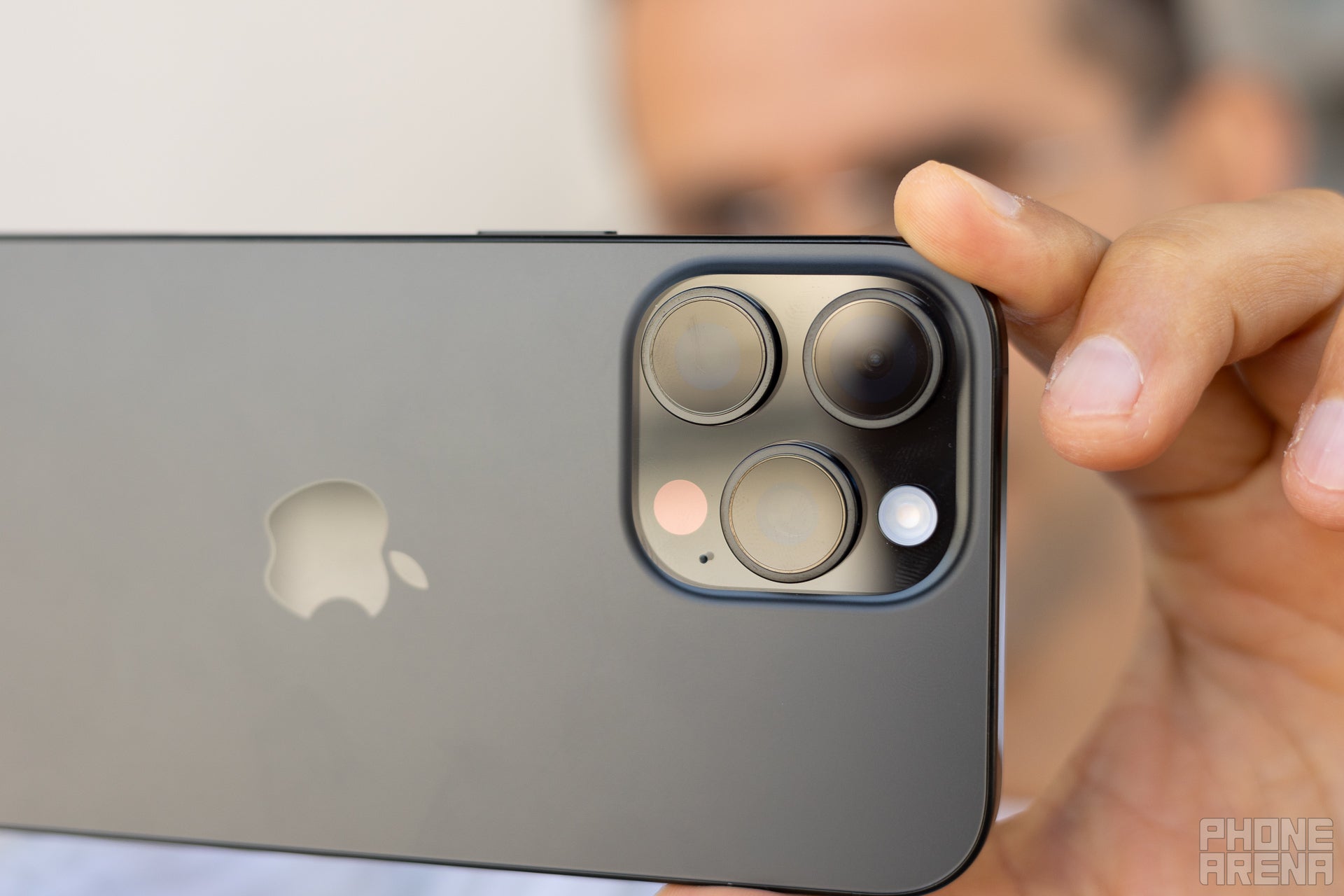
The Triforce is back (Image credit - PhoneArena)
Now that Apple has upgraded the main camera and the telephoto camera on the iPhone Pro Max in the past, it's time for the ultra-wide to shine.
So, the main camera retains that 48 MP sensor that was an excellent upgrade a couple of years ago. The 12 MP zoom camera still comes with that 5x tetraprism lens. And now, we get a 48 MP ultra-wide camera to match that main one. Apple still does quad-pixel binning for 12 MP pictures with better light sensitivity, but you can choose to use full resolution — the Camera must be set to HEIF Max for this option to be enabled. Keep in mind, HEIF Max disables Live Photo, if that's a feature you still rely on.
You will notice that the iPhone 16 Pro Max did not jump immensely in our camera score. It's lagging behind the top score by a couple of points in every category, with only its new ultra-wide lensreaching the current "best" in video recording, which is 23. Our camera benchmark is a complex process, which takes the phones through a variety of tests and measures the experience from viewfinder and app comfort to actual photo quality and judging post-processing artifacts.
As for video, we are getting some massive upgrades to audio recording, with the power of AI and the iPhone 16 Pro's excellent microphones. You are be able to filter out and process voices from a recorded video. Basically, it seems to also record audio metadata and directional information, so you can edit out background noises or even do some slight "mastering" to make all voices within the shot to sound as if they are center-positioned (movie-like).
Slow motion capture has gotten a huge upgrade — now able to record 4K at 120 FPS. That's a lot of frames that you can slow down at super-high res and aspiring vloggers or film enthusiasts would problably love to play with that.
An upgrade for Photographic Styles has also been introduced — now, we get even more control over how styles act and adjust vibrancy on per-color basis, if we wish. You will also be able to retroactively remove them from photos, so... kind of like advanced filters?
And, of course, we can't not mention the AI image tuneups that were inevitable. iOS 18 has the new "Clean Up" tool in Photos, which allows you to easily remove an object, much like Google's Magic Eraser feature. Apple has added a few nice animations to this and while the results are not always perfect, it's a really cool tool to have.
An upgrade for Photographic Styles has also been introduced — now, we get even more control over how styles act and adjust vibrancy on per-color basis, if we wish. You will also be able to retroactively remove them from photos, so... kind of like advanced filters?
And, of course, we can't not mention the AI image tuneups that were inevitable. iOS 18 has the new "Clean Up" tool in Photos, which allows you to easily remove an object, much like Google's Magic Eraser feature. Apple has added a few nice animations to this and while the results are not always perfect, it's a really cool tool to have.
We delve deeper into what's new and how the camera operates in our dedicated iPhone 16 camera explained article.
That said, here's how the iPhone 16 Pro Max camera performs:
As we are used to, photos from the iPhone 16 Pro Max are pretty striking and close to reality. Dynamics are handled great and colors are, more often than not, accurate. We specifically like how the iPhones handle greenery — smartphones, even the top-tier ones, often skew these colors. Skintones are also lively and close to real. One thing that irks us is that the iPhone 16 Pro Max does introduce some oversharpening. We feel this has been happening since Apple upgraded to a 48 MP sensor back with the iPhone 14 Pro series — kind of like Apple wants us to feel like the pictures are really that much sharper. Not an issue on phone displays, but we can spot it when we look at the photos on a big screen.
As the sun goes down, the iPhone 16 Pro Max camera still performs gracefully. There's a lot of noise reduction and sharpening going on, but we feel it's being handled tastefully here. There aren't many visual artifacts, most detail is preserved, and — in this case — the sharpness of the photos looks pleasing.
Main Camera
As we are used to, photos from the iPhone 16 Pro Max are pretty striking and close to reality. Dynamics are handled great and colors are, more often than not, accurate. We specifically like how the iPhones handle greenery — smartphones, even the top-tier ones, often skew these colors. Skintones are also lively and close to real. One thing that irks us is that the iPhone 16 Pro Max does introduce some oversharpening. We feel this has been happening since Apple upgraded to a 48 MP sensor back with the iPhone 14 Pro series — kind of like Apple wants us to feel like the pictures are really that much sharper. Not an issue on phone displays, but we can spot it when we look at the photos on a big screen.
As the sun goes down, the iPhone 16 Pro Max camera still performs gracefully. There's a lot of noise reduction and sharpening going on, but we feel it's being handled tastefully here. There aren't many visual artifacts, most detail is preserved, and — in this case — the sharpness of the photos looks pleasing.
Ultra-wide camera
And here's the new ultra-wide camera. Nothing too different from the old one, but that's not a bad thing. It's tuned to have the same colors as the main camera, it handles dynamics very well (which is a challenging point for ultra-wide cameras due to their smaller aperture), and it seems to apply barrel distortion correction, which we can't spot exactly, though if you happen to catch vegetation around the edge of the frame, you can see some weird halos or outlines around it.
Zoom Quality
The iPhone 16 Pro Max's tetraprism lens has a 5x magnification. From then on, it's all digital, and Apple stops at 25x. Cupertino is not interested in the super-zoom wars, it appears. So, how's the quality? Pretty good!
Unlike the main camera, Apple doesn't seem to apply a lot of sharpening when postprocessing the zoomed photos. Combined with the lower res sensor, these do give us noisier photos with softer detail, which are just not on par with 2025 standards. And Apple knows this, which is why the iPhone 17 Pro did get an upgrade in this department.
So, while the 5x lens of the iPhone 16 Pro Max is not bad, it's nothing to write home about either.
The 12 MP selfie camera takes great photos. They are not super-sharp, but have plenty of detail, very good dynamic range, and most importantly — good skintones. Oddly enough, specific lighting can still get iPhones to trip up with skintones, making them appear too red. We've found that selfies during "Golden Hour" may get that effect, if there's a large shadow behind you. But, aside from those odd cases, you will be getting good selfies.
Selfies
The 12 MP selfie camera takes great photos. They are not super-sharp, but have plenty of detail, very good dynamic range, and most importantly — good skintones. Oddly enough, specific lighting can still get iPhones to trip up with skintones, making them appear too red. We've found that selfies during "Golden Hour" may get that effect, if there's a large shadow behind you. But, aside from those odd cases, you will be getting good selfies.
iPhone 16 Pro Max Performance & Benchmarks
Superpowered silicon, 20% cooler
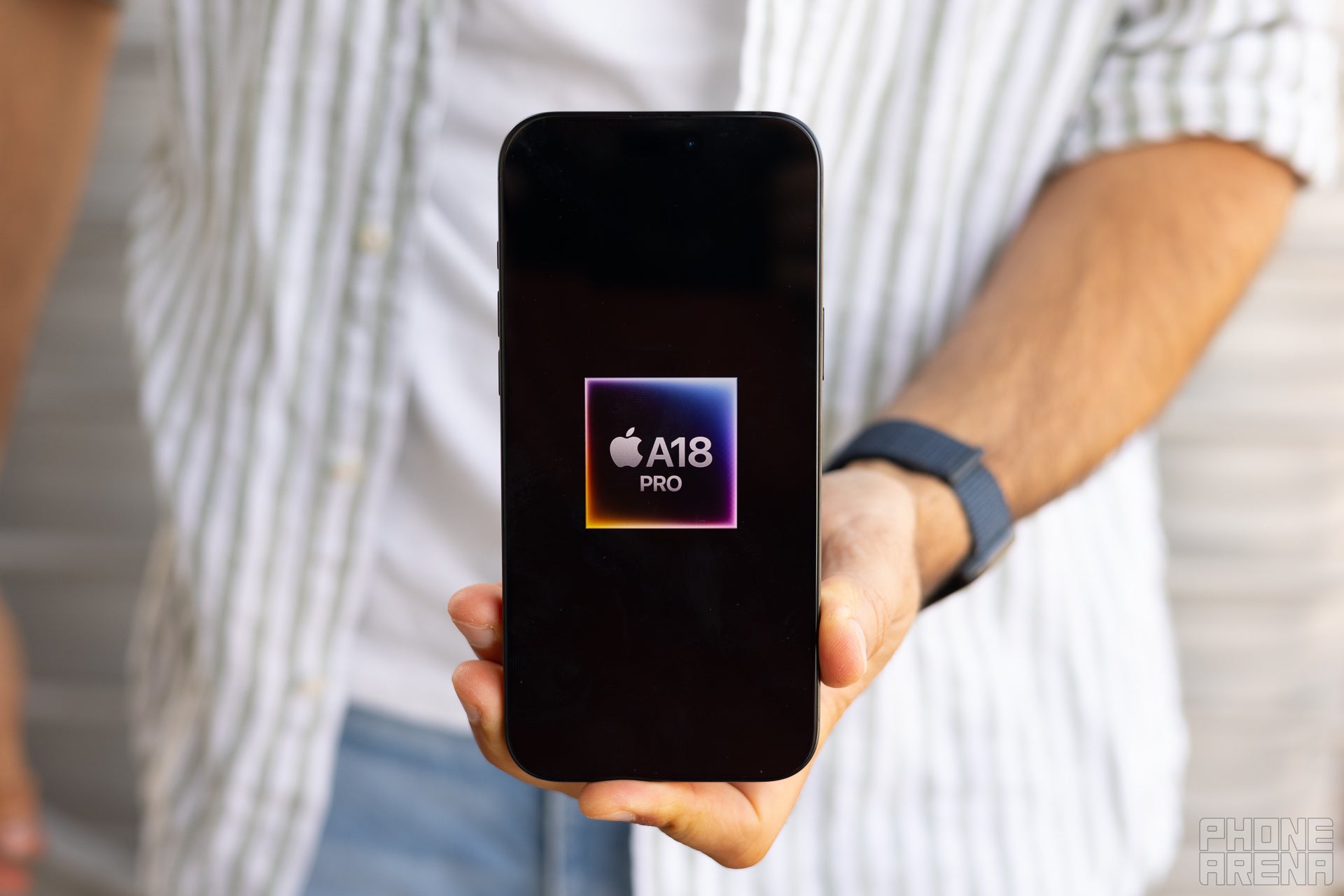
New gen 3 nm chip inside (Image credit - PhoneArena)
The 16 Pro Max has the new Apple A18 Pro chipset humming inside. It's built on an improved 3nm process and comes with a 6-core GPU to power these gaming moments. And, Apple specifically stated that the improved thermals of the new iPhones will ensure at least 20% better sustained performance. A clear throwback to last year's phones with the A17 Pro, which weren't doing great in the heat department.
No joke, Apple is taking a foray into gaming — console-grade games have started popping up for iOS and iPadOS — and the new iPhones supposedly have improved cooling for better sustained performance. Sooo... benchmarks:
Well yes, both peak performance and sustained numbers are, indeed, better. But it's worth noting that when we run the 3DMark test, the iPhone 16 Pro Max still starts off strong and throttles immediately after the first cycle. This is a benchmark that is designed to overload and overheat phones by running 20 times in one session. Android flagships from its time can sustain their top performance for about 3 cycles — highly tuned ones like the ROG Phones can do so for 17 or all 20 cycles. The iPhone throttles faster but does not go as low as the Galaxy S24 Ultra in the example here.
What that translates to is that, even though I can play Assassin's Creed: Mirage on the iPhone 16 Pro Max, it stutters and hovers around 30 FPS or less. The 17 Pro Max is a huge improvement here.
We now get Wi-Fi 7 as well. It's something that Android flagships were prepared for almost a year prior. It's a new protocol and standard, which allows for much faster — and more stable — data transfers between your phone and router. You do need the latter to be Wi-Fi 7 compliant as well, of course.
But, Apple will also want it to shine in AI. There are exclusive NPU cores inside the A18 Pro to power those Apple Intelligence features that will be coming out throughout the year.
Storage options start at 256 GB and go up to 512 GB and 1 TB, like last year. Prices start from $1,199 — no change there, thankfully.
iPhone 16 Pro Max Software
AI will be the name of the game for a while, and iOS 18 is jumping into the fray loaded with various AI features. Scratch that, it's not exactly "jumping in" — we were promised a lot of features, but they are on a gradual rollout.
First, we got iOS 18.1 in October with the first batch of AI features. They are about text — edit, generate, and rephrase emails and texts. Get summaries for your stach of notifications or emails. Ask Photos to find specific photos — it can look for people, settings, locations, and actions combined, so you can find that one photo from when you were "playing the air guitar next to the lake". Clean Up for Photos is also long overdue — it's Apple's Magic Eraser, basically an object deleter that regenerates the background. Call summaries is also live now, where Siri will record your call and generate a note of what was discussed.
In December, iOS 18.2 came with the image-related featureset, including Image Playground, Genmoji, Visual Intelligence, and Image Wand. The ChatGPT integration with iOS is also now live. Why use ChatGPT? While Apple's Image Playground specializes in animations, ChatGPT allows users to generate photo-realistic images through DALL-E, accessible via Siri commands or keyboard shortcuts. Additionally, ChatGPT excels in composing longer text, while Apple's own AI is tailored more to short replies.
What was left out was a big Siri upgrade, which Apple talked up all the way back at WWDC 2024. It was supposed to come in March 2025, but didn't — needs some more time in the oven. About a year or so.
Now, we have iOS 26 in its full Liquid Glass beauty on the iPhone 16 Pro Max. The update works great on the phone, I've only noticed that the Liquid Glass animations get very choppy when I engage Battery Saver mode, as it pulls down the processing power by quite a bit. Otherwise, all features, UI elements, and updates are available as they are on the 17 Pro Max.
Now, we have iOS 26 in its full Liquid Glass beauty on the iPhone 16 Pro Max. The update works great on the phone, I've only noticed that the Liquid Glass animations get very choppy when I engage Battery Saver mode, as it pulls down the processing power by quite a bit. Otherwise, all features, UI elements, and updates are available as they are on the 17 Pro Max.
iPhone 16 Pro Max Battery
Bigger battery, faster charging?
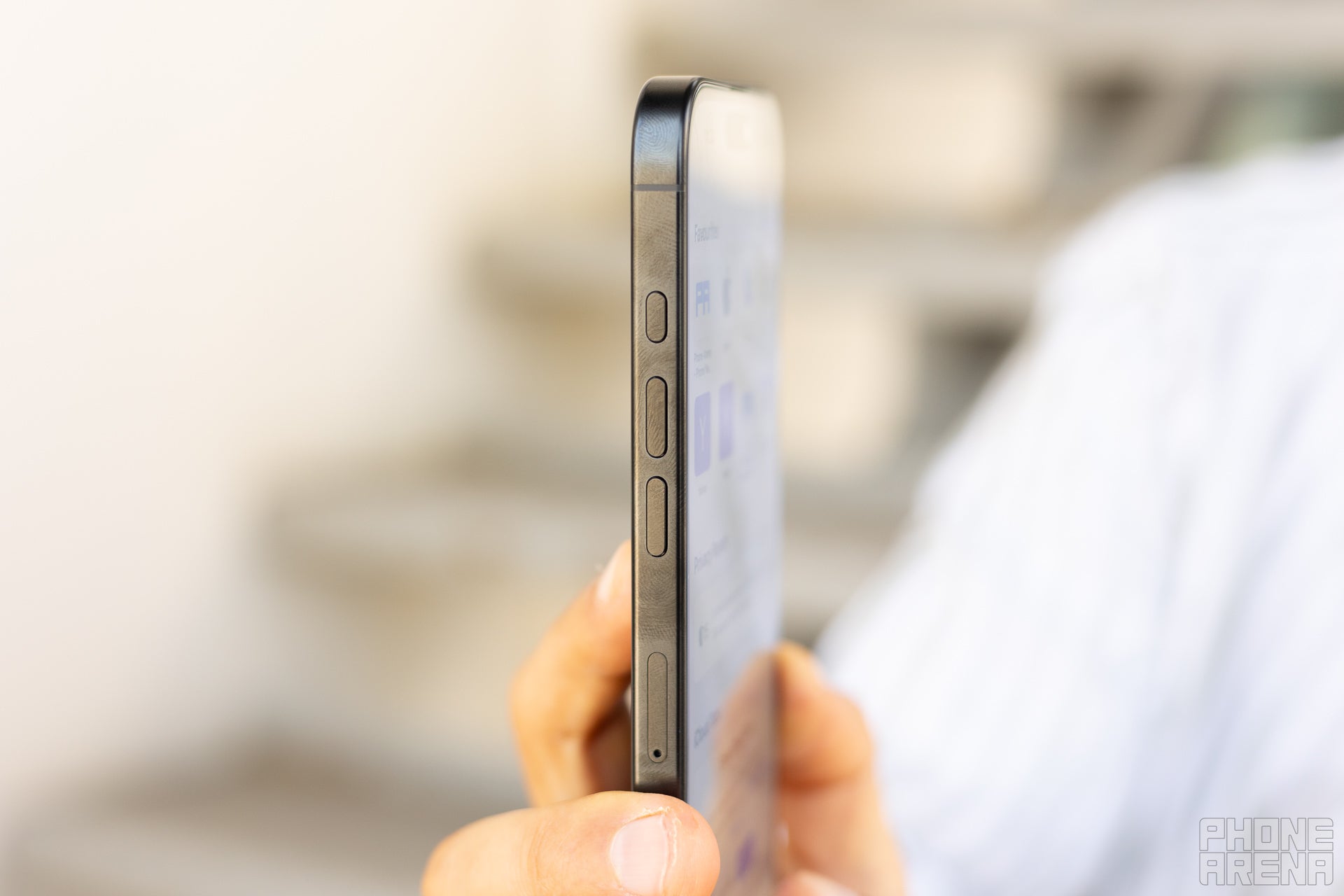
Energized (Image credit - PhoneArena)
With a slightly bigger size, the iPhone 16 Pro Max does house a slightly bigger battery. Apple doesn't reveal those "geeky numbers", though, not for iPhones. Thanks to teardowns from tech pundits we now know that it's a 4,685 mAh. Still smaller than the typical 5,000 mAh we'd get on an Android flagship, but definitely the biggest battery in an iPhone thus far.
We delve deeper into the iPhone 16 series battery improvements here.
But it also comes down to the CPU's energy efficiency and iOS' ability to manage and freeze background tasks. We typically get great battery life from the Pro Max models, and we are happy to report that the iPhone 16 Pro Max does not disappoint:
22 hours of web browsing is nothing to snark at — we test that with a script, which scrolls and reloads pages constantly, so it simulates pretty active use. But then, we have 10 hours of YouTube streaming and 12 hours of gaming. Both of these activities are pretty demanding, so hitting 10 full hours of screen-on time with them is a pretty big deal. Again, since this is a phone, you will often turn that display off and leave it in standby, and this is where iOS shines. It preserves those percentages from trickling down while the phone is not in use, and we've found that the iPhone 16 Pro Max can confidently be a "two day phone".
Apple hasn't been in a hurry to get fast charging to its phones. The iPhone 16 Pro Max now gets upgraded MagSafe — 25 W MagSafe charging, up from 15 W. But wired charging is still capped at 20W. So, whether you choose to plop it on a MagSafe charger or plug it in, you will still get relatively same-ish charging speeds. And those are kind of slow by today's standards. But, being realistic, you do get around 57% for only 30 minutes of charging, and that should be plenty enough to last you through the day.
iPhone 16 Pro Max audio and haptics
We don't detect much difference in the speakers this year. Pro Max iPhones typically sound big and wide, with a sound signature that's a bit scooped, but has a pronounced bass and silky highs. It's the same case here. We still avoid pumping the volume up to 100%, since the highs may get a bit unpleasant up there, depending on what you are listening to. But a tick or two down from maximum sounds great.
The haptics are fantastic, as usual. This year, we have a second Taptic engine dedicated to the Camera Control button, so you get clear and accurate feedback with it, too. All the clicks throughout the interface are satisfying, precise, and fun.
Summary
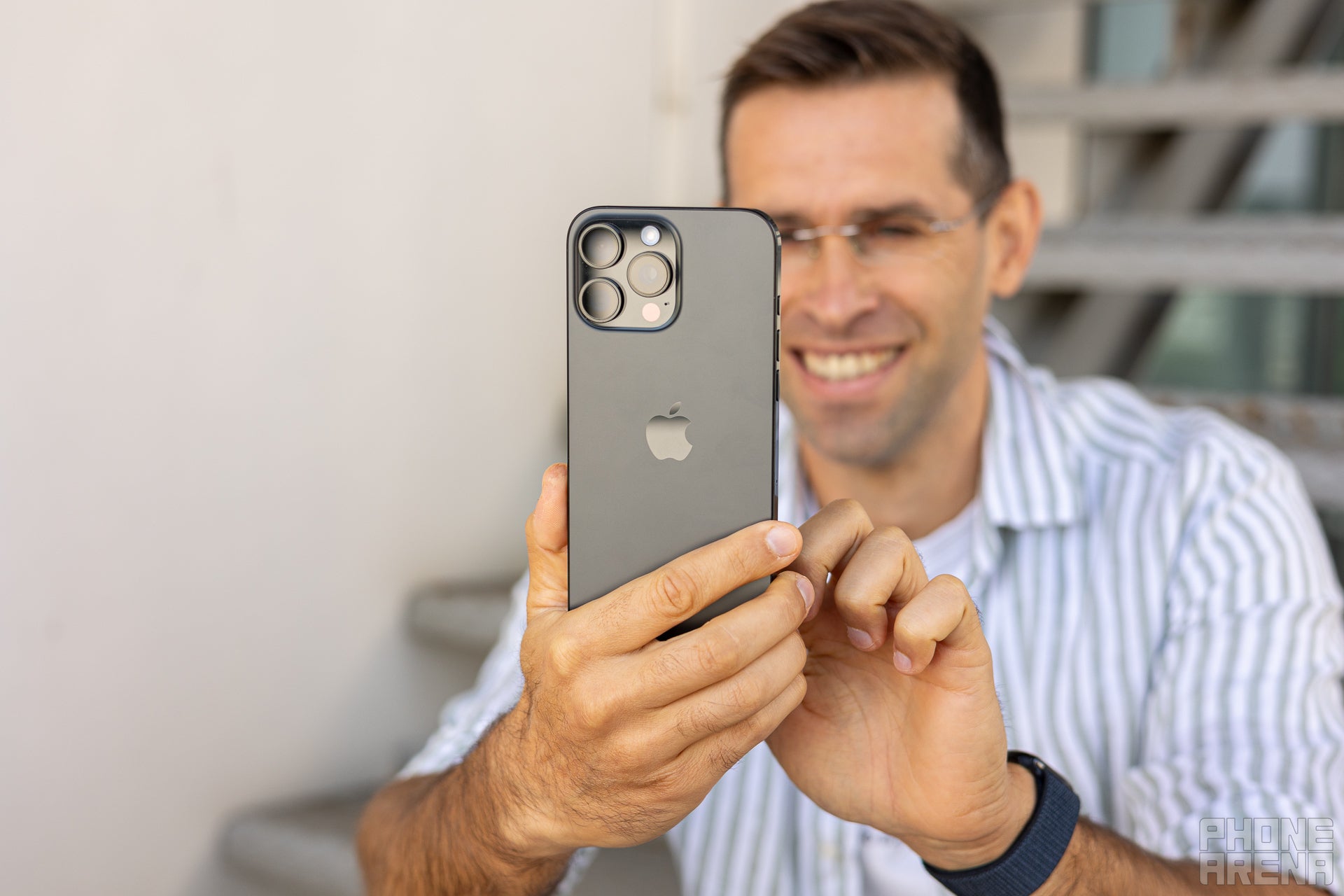
Good as ever (Image credit - PhoneArena)
The iPhone 16 Pro Max is a very solid smartphone, no surprises there. I still enjoy the design and it might be your go-to if you don't agree with Apple's new "Camera Plateau" direction. Though, the latter is guaranteed to stick around for some years now, maybe they will figure out the aluminum chipping issue before we are forced to upgrade.
The only downside of the iPhone 16 Pro Max, I'd say, is its zoom camera, which just feels very sub-par compared to contemporary phones from all sides. The 12 MP sensor intrudices noise and softness and is not great in low light. That aside, the iPhone 16 Pro Max rarely disappoints when it comes to general photos, video, and performance.
It's worth noting that if you are drawn to playing these console-grade games that Ubisoft, Kojima, Konami etc. are porting to iOS now — it's probably better to get an iPhone 17 Pro Max. The thermal management makes a huge difference. While the 16 Pro Max struggles to hit 30 FPS, the new model comfortably sits way above 40 FPS.
And that's the only bad thing I can say about the iPhone 16 Pro Max. If your reaction was "Oh... I don't care about that" — you have your answer.
Follow us on Google News


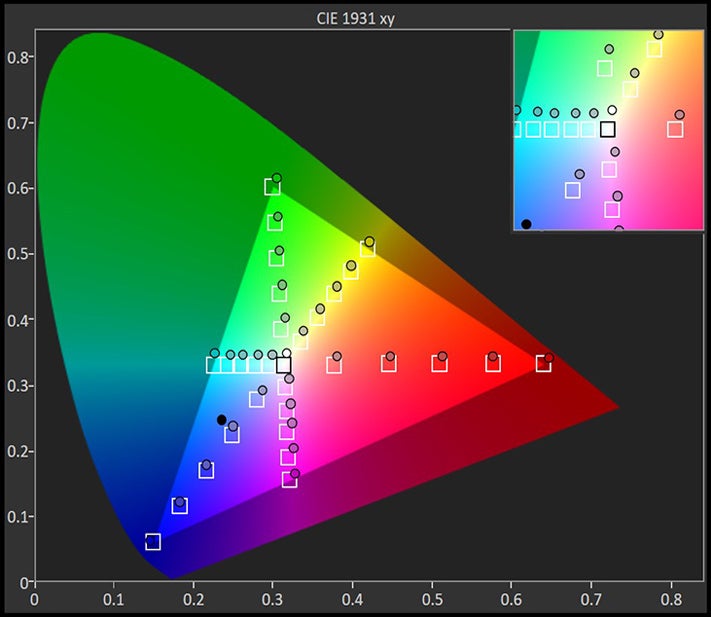
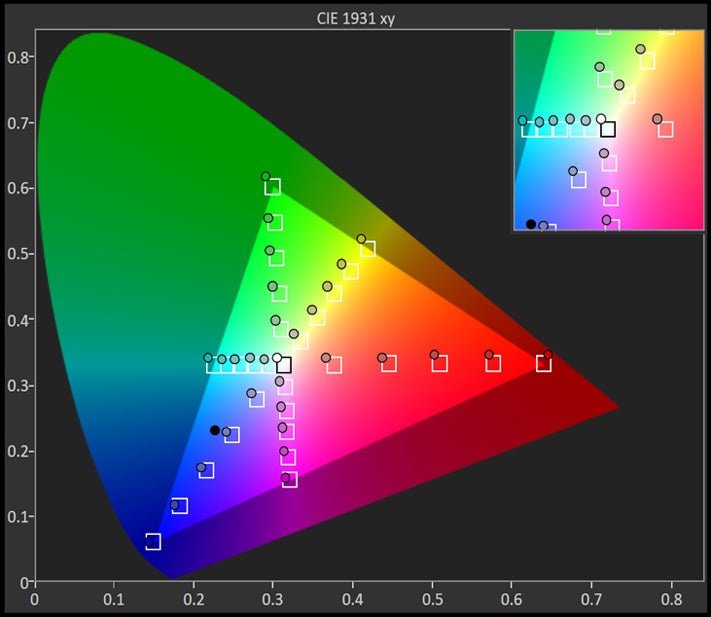


























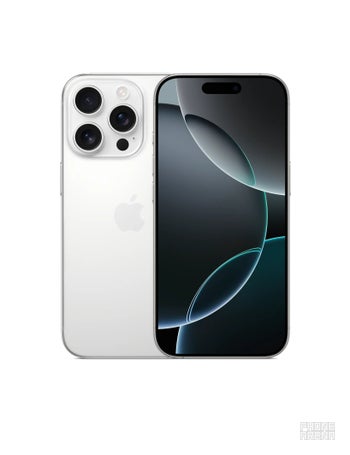



















Things that are NOT allowed:
To help keep our community safe and free from spam, we apply temporary limits to newly created accounts: